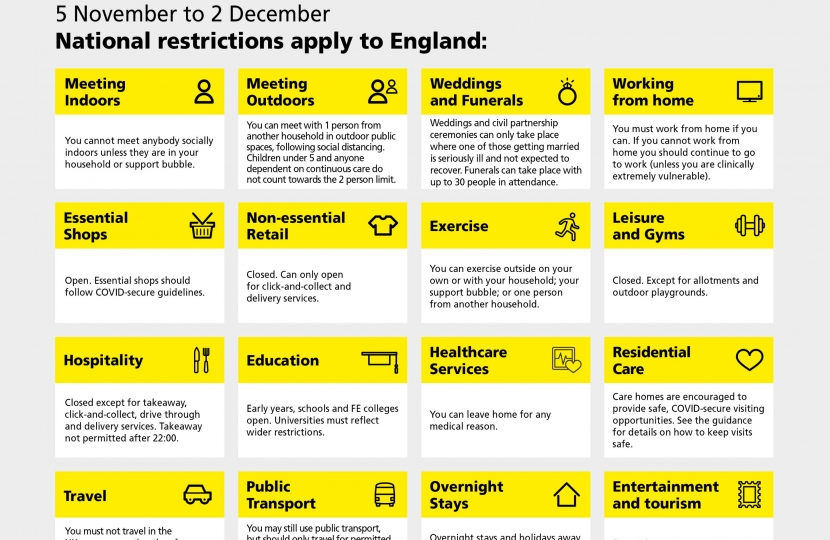
As the Prime Minister has set out, we are at a critical stage to fight this second wave of coronavirus. The risk is that for the first time in our lives, the NHS will not be there for us and for our families.
That is why, from Thursday 5 November until the start of December, you must stay at home. You may only leave home for specific reasons, including: for education; for work if you cannot work from home; for exercise; for medical reasons, appointments and to escape injury or harm; to shop for food and essentials; and to provide care for vulnerable people, or as a volunteer.
Our priority, remains keeping people in education – so childcare, early years settings, schools, colleges and universities will all remain open. Our senior clinicians still advise that school is the best place for children to be.
This aggressive action allows us the prospect of a better December. The alternative would be even more stringent, and longer-lasting, interventions through December and thereafter. What happens next depends on each and every one of us. It is therefore necessary to stay at home; protect the NHS; and save lives. New national restrictions to control the virus:
· The public must stay at home, and may only leave home for limited reasons, including: education; work or volunteering, if it is impossible for do this from home; exercise and recreation outdoors (with your household or on your own with one person from another household); medical reasons, appointments and to escape injury or harm; provision of care for a child – including informal childcare – or vulnerable person. There is no exemption for staying away from home on holiday. This means people cannot travel internationally or within the UK, unless for work, education or other legally permitted exemptions. Overnight stays away from primary residences will not be allowed, except for specific exceptions including for work.
· Non-essential shops, pubs, bars, restaurants, leisure and entertainment venues will all be closed – but will be able to provide takeaway. Essential shops will stay open: there is no need for people to stock up.
· Workplaces should stay open where people cannot work from home – for example in the construction or manufacturing sectors.
· Adults living alone will still be able to form support bubbles, and children will still be able to move between homes if their parents are separated.
· Those who are clinically vulnerable, or over the age of 60, will be advised to be especially careful to follow the rules. The Government will not ask people to shield in the same way again.
There is more information on the restrictions HERE and you can read the full legislation covering the regulations HERE.
· For the clinically extremely vulnerable, the Government has issued new guidance on keeping safe. Letters will be going out later this week to all those identified as clinically extremely vulnerable, providing them with further detail on the updated guidance and on how to access the support available. The updated guidance can be found HERE.
· Children under school age who are with their parents will not count towards the limit on two people meeting outside. This will mean that a parent can see a friend or family member with their baby or young children. Children and adults who are dependent on around-the-clock care, such as those with severe disabilities, will also be included.
· Elite sport will be allowed to continue behind closed doors. But there will be no exemption for other organised team sports, and indoor and outdoor leisure facilities such as leisure centres, gyms, swimming pools and golf courses will have to close.
The Government has updated its guidance for care homes, and visits should be tailored to residents and facilities and prioritise residents and staff’s safety to limit the transmission of COVID-19. All care home residents in England should be allowed to receive visits from their family and friends in a COVID-secure way – with social distancing and PPE. Care home providers, families and local professionals should work together to find the right balance between the benefits of visiting on wellbeing and quality of life, and the risk of transmission of coronavirus. Arrangements should be adapted from home to home, based on the needs of residents and taking into consideration factors such as layout and facilities. You can read more about that HERE.
The primary differences to the initial lockdown in March:
- These are time-limited measures. On the 2 December, we will seek to ease restrictions, on a local and regional basis, according to the latest data.
- Our priority remains keeping young people in education - so formal and informal childcare, early years settings, schools, colleges and universities will all remain open. Our senior clinicians still advise that school is the best place for children to be.
- We will also keep provision for non-coronavirus healthcare needs going. We will continue to say clearly to the public that unless their clinicians tell them otherwise they should continue to use the NHS, get their scans, turn up for their appointments and pick up their treatments.

